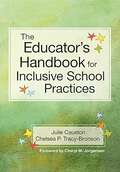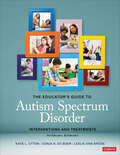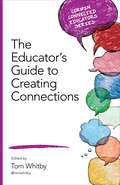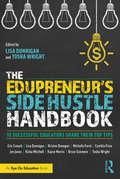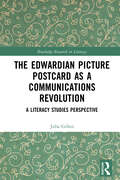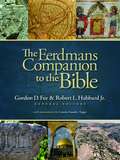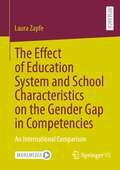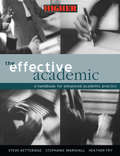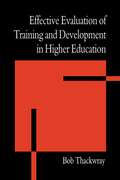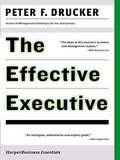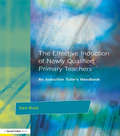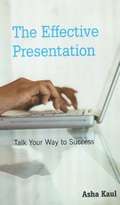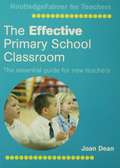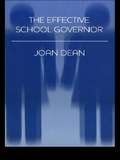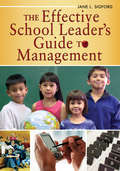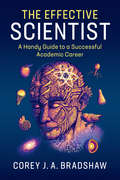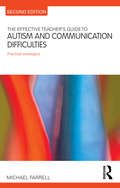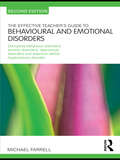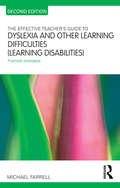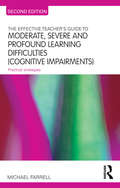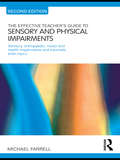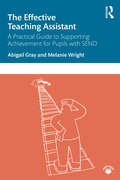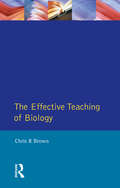- Table View
- List View
The Educator’s Handbook for Inclusive School Practices
by Julie Causton Chelsea P. Tracy-BronsonAs more K-12 schools move toward inclusion, how can general and special educators work together to create warm, welcoming classrooms where all students learn and belong? Discover practical answers in this friendly, down-to-earth teacher’s guide. Filled with ready-to-use teaching tips, insights from inclusive educators, and examples that relate directly to everyday classroom experiences, this book will help general and special educators collaborate effectively and build a great “toolbox” of strategies to support all learners within inclusive classrooms. With this highly motivating guidebook close at hand, new and seasoned educators will create engaging, exciting, and joyful inclusive classrooms that support social and academic success for all. STRATEGIES THAT HELP TEACHERS: • ensure that all students have access to the general education curriculum in the least restrictive environment • presume competence and recognize every student’s unique strengths • meet students’ individual learning needs with differentiated lessons and innovative academic supports • team up and collaborate with other educators and professionals to make the most of everyone’s expertise • distinguish an IEP from a 504 plan, and develop and implement both appropriately • support students who have behavior challenges with a classroom-wide positive behavior support system • promote academic and social inclusion in the classroom and in recreational spaces, from the playground to the lunchroom • supervise the important work of paraprofessionals • avoid burnout with self-care strategies and stress-busters PRACTICAL RESOURCES: Planning tools and checklists to help you identify student strengths, develop IEPs, plan lessons, strengthen co-teaching, choose modifications and accommodations, and more.
The Educator′s Guide to Autism Spectrum Disorder: Interventions and Treatments
by Kaye L. Otten Sonja R. de Boer Leslie Ann BrossIdentify the best interventions to fit the unique needs of each learner with autism Whatever your role—general or special education teacher, school counselor, therapist, behavior analyst, administrator—you undoubtedly interact with learners with autism spectrum disorder (ASD) and are committed to helping them succeed and thrive. This easy-to-use accessible guide summarizes more than 75 interventions and rates each based on the most recent evidence of effectiveness and safety. Features include: A summary of interventions and treatments from a comprehensive variety of domains organized into 11 categories, including behavioral interventions, visual supports, social and emotional skills training, and physiological interventions, as well as interventions that have the potential for causing harm An evidence-based five-point scale that clearly rates each intervention’s effectiveness for specific learners Guidance for working with colleagues and families to choose and implement the most promising treatments Written by educators with decades of experience and expertise in a variety of settings, many of whom are also Board Certified Behavior Analysts, this comprehensive guide is an indispensable resource for all those who serve students with ASD.
The Educator′s Guide to Autism Spectrum Disorder: Interventions and Treatments
by Kaye L. Otten Sonja R. de Boer Leslie Ann BrossIdentify the best interventions to fit the unique needs of each learner with autism Whatever your role—general or special education teacher, school counselor, therapist, behavior analyst, administrator—you undoubtedly interact with learners with autism spectrum disorder (ASD) and are committed to helping them succeed and thrive. This easy-to-use accessible guide summarizes more than 75 interventions and rates each based on the most recent evidence of effectiveness and safety. Features include: A summary of interventions and treatments from a comprehensive variety of domains organized into 11 categories, including behavioral interventions, visual supports, social and emotional skills training, and physiological interventions, as well as interventions that have the potential for causing harm An evidence-based five-point scale that clearly rates each intervention’s effectiveness for specific learners Guidance for working with colleagues and families to choose and implement the most promising treatments Written by educators with decades of experience and expertise in a variety of settings, many of whom are also Board Certified Behavior Analysts, this comprehensive guide is an indispensable resource for all those who serve students with ASD.
The Educator′s Guide to Creating Connections (Corwin Connected Educators Series)
by Tom WhitbyBlogging, social media, and PLN’s made easy! Collectively, we’re all smarter than we are individually. In this expert guide, EdTech leaders help you harness the power of connected collaboration using the Internet and social media. You’ll easily leverage Twitter, Facebook, LinkedIn and beyond for profound professional growth. Use real-world tips and tools to: Master and adapt to 21st Century teaching methodologies Build ongoing technology literacy for you and your students Connect and collaborate with education leaders across the globe Get connected. Get engaged. Use this inspiring, step-by-step manual to expand your personal and professional network today! The Corwin Connected Educators series is your key to unlocking the greatest resource available to all educators: other educators. Being a Connected Educator is more than a set of actions: it’s a belief in the potential of technology to fuel lifelong learning. "The successful educator is a connected educator. Quite simply, this book is a manual to stay relevant and energized in a rapidly changing profession. I highly recommend this as the definitive guidebook on building connections for the modern educator." Vicki Davis, Author "Reinventing Writing" Tom Whitby has brought together a who′s who list any educator would want to be connected with and learn from! His latest book shares great ideas on how teachers can use online strategies as one way to look and learn beyond our all-too-often isolated classrooms. Larry Ferlazzo, Award-Winning Teacher, Blogger, and Author Helping Students Motivate Themselves
The Educator′s Guide to Creating Connections (Corwin Connected Educators Series)
by Tom WhitbyBlogging, social media, and PLN’s made easy! Collectively, we’re all smarter than we are individually. In this expert guide, EdTech leaders help you harness the power of connected collaboration using the Internet and social media. You’ll easily leverage Twitter, Facebook, LinkedIn and beyond for profound professional growth. Use real-world tips and tools to: Master and adapt to 21st Century teaching methodologies Build ongoing technology literacy for you and your students Connect and collaborate with education leaders across the globe Get connected. Get engaged. Use this inspiring, step-by-step manual to expand your personal and professional network today! The Corwin Connected Educators series is your key to unlocking the greatest resource available to all educators: other educators. Being a Connected Educator is more than a set of actions: it’s a belief in the potential of technology to fuel lifelong learning. "The successful educator is a connected educator. Quite simply, this book is a manual to stay relevant and energized in a rapidly changing profession. I highly recommend this as the definitive guidebook on building connections for the modern educator." Vicki Davis, Author "Reinventing Writing" Tom Whitby has brought together a who′s who list any educator would want to be connected with and learn from! His latest book shares great ideas on how teachers can use online strategies as one way to look and learn beyond our all-too-often isolated classrooms. Larry Ferlazzo, Award-Winning Teacher, Blogger, and Author Helping Students Motivate Themselves
The Edupreneur's Side Hustle Handbook: 10 Successful Educators Share Their Top Tips
by Lisa Dunnigan Tosha WrightFind out how you can use your talents as an educator to make extra money on the side! In this helpful book, top Instagram influencers share how they’ve had success with selling lesson plans, handouts, t-shirts, and more, while maintaining careers as teachers and school leaders. You’ll hear from these inspiring educators: Lisa Dunnigan and Tosha Wright @thewrightstuffchics Jen Jones @hellojenjones Michelle Ferré @pocketfulofprimary Kisha Mitchell @sweetteaandsunshinepodcast Bryce Sizemore @theteachingtexan Kristen Donegan @easyteachingtools Cynthia Frias @followsocialone Kayse Morris @kaysemorris Eric Crouch @adventureswithmrc If you’ve always dreamed of having a side hustle but weren’t sure you had the time or the know-how, this is the book for you. Each chapter offers tons of practical tips to help you get started, along with humorous anecdotes and words of wisdom to keep you motivated on your journey.
The Edwardian Picture Postcard as a Communications Revolution: A Literacy Studies Perspective (Routledge Research in Literacy)
by Julia GillenThis monograph offers a novel investigation of the Edwardian picture postcard as an innovative form of multimodal communication, revealing much about the creativity, concerns and lives of those who used postcards as an almost instantaneous form of communication. In the early twentieth century, the picture postcard was a revolutionary way of combining short messages with an image, making use of technologies in a way impossible in the decades since, until the advent of the digital revolution. This book offers original insights into the historical and social context in which the Edwardian picture postcard emerged and became a craze. It also expands the field of Literacy Studies by illustrating the combined use of posthuman, multimodal, historic and linguistic methodologies to conduct an in-depth analysis of the communicative, sociolinguistic and relational functions of the postcard. Particular attention is paid to how study of the picture postcard can reveal details of the lives and literacy practices of often overlooked sectors of the population, such as working-class women. The Edwardian era in the United Kingdom was one of extreme inequalities and rapid social change, and picture postcards embodied the dynamism of the times. Grounded in an analysis of a unique, open access, digitized collection of 3,000 picture postcards, this monograph will be of interest to researchers and postgraduate students in the fields of Literacy Studies, sociolinguistics, history of communications and UK social history.
The Eerdmans Companion to the Bible
by Gordon D. Fee Robert L. Hubbard Jr.A quality guidebook that opens up new vistas and insights into the whole BibleMarked by a broad evangelical perspective, up-to-date research, and contributions from respected biblical scholars, The Eerdmans Companion to the Bible offers a reliable and illuminating guide to the entire Bible. Whether readers find the Bible familiar or foreign, they will appreciate the Companion’s informative articles and its commentary by Connie Gundry Tappy on all of the Old and New Testament books. This comprehensive reference work promises to make the Word of God come alive as never before.Compiled by some of the foremost biblical scholars in the world todayNew articles by sixty expert authors on many pertinent biblical topicsWell-written background information and commentary on every book of the BibleIllustrated with maps, photos, and charts throughout
The Effect of Education System and School Characteristics on the Gender Gap in Competencies: An International Comparison
by Laura ZapfeLaura Zapfe’s aim is to explain how education system and school characteristics affect the gender gap in mathematics and reading competencies. She adapts the macro-meso-micro model. At the micro level, she uses theories, e.g., gender-specific socialization, highlighting how gender-specific expectations and stereotypes cause gendered interest and skills and therefore gender differences in mathematics and reading. Deriving a macro-meso-micro link, she explains how education system characteristics such as competition, differentiation, and standardization, and school characteristics could increase or decrease the gender-specific socialization effects, leading to larger or smaller gender gaps in mathematics and reading competencies. On this basis, she performs a cross-national comparison of 78 countries participating in the Programme for International Student Assessment (PISA) 2018, combined with further researched macro data with three-level mixed-effects models. The results show that boys have an advantage in mathematics, girls have an advantage in reading, the gender effects are slightly higher for reading, and the gender effects at the school level are more pronounced than those at the country level.
The Effective Academic: A Handbook for Enhanced Academic Practice
by Heather Fry Stephanie Marshall Steve KetteridgeOffers discussion, advice, expert opinion and case studies of best practice, covering the various parts of academic practice that are associated with career progression and promotion. The book is particularly aimed at education professionals aspiring to develop leadership responsibilities.
The Effective Evaluation of Training and Development in Higher Education
by Bob ThackwrayThis text puts forward the argument that higher education must develop better and more consistent practices with regards to the evaluation of training and development. Most evaluations are valueless unless they start by clarifying the puropse they are intended to serve, and this usually means clarifying whose puropses are being served. This text provides a guide to best practices and uses examples and case studies from both the UK and abroad to show the benefits that can be gained from using evaluation effectively.
The Effective Executive
by Peter Drucker<p>The measure of the executive, Peter F. Drucker reminds us, is the ability to "get the right things done." This usually involves doing what other people have overlooked as well as avoiding what is unproductive. Intelligence, imagination, and knowledge may all be wasted in an executive job without the acquired habits of mind that mold them into results. <p>Drucker identifies five practices essential to business effectiveness that can, and must, be learned: <li>Managing time <li>Choosing what to contribute to the organization <li>Knowing where and how to mobilize strength for best effect <li>Setting the right priorities <li>Knitting all of them together with effective decision-making</li> <p> <p>Ranging widely through the annals of business and government, Peter F. Drucker demonstrates the distinctive skill of the executive and offers fresh insights into old and seemingly obvious business situations.</p>
The Effective Induction of Newly Qualified Primary Teachers: An Induction Tutor's Handbook
by Sara Bubb Peter MortimoreFirst Published in 2000. Routledge is an imprint of Taylor & Francis, an informa company.
The Effective Presentation
by Asha KaulDesigned to respond to the growing needs of professionals and those in the academia, this book is a comprehensive, step-by-step guide to making effective presentations. Written in a clear, accessible style, the author provides a friendly approach to a process that is often a nerve-wracking task for many. The author discusses how to plan presentations across disciplines, their delivery and aesthetics, and helpful tips throughout. With a multi-level focus, it also includes sections on: --choosing the right content and then sequencing it logically for maximum impact --duration of the presentation, ideal size of the audience and their level of understanding and knowledge base --presentation delivery, styles of communication, writing tips and the use of PowerPoint and video conferencing --audience interaction --strategies to avoid common pitfalls
The Effective Primary School Classroom: The Essential Guide for New Teachers
by Joan DeanThis book describes good practice in the primary school and offers advice particularly to beginning teachers and students. It begins by considering the children, their physical, intellectual and emotional development and the development of their self-image. It makes suggestions about ways in which a teacher can assess a new class and stresses the importance of motivation and first-hand experience.The Effective Primary School Classroom covers all the issues teachers are faced with in their day-to-day work and includes chapters on: managing time and space teaching and learning working in groups evaluation and record keeping classroom management working with support staff working with parents. In addition, there is discussion of ways of organising learning to help children acquire the learning set out in the National Curriculum. Including case studies and suggestions for investigations, this text is essential reading for student teachers about to begin school placements or newly qualified teachers just starting their first post. More experienced teachers and teacher trainers will also find the book a useful resource.
The Effective School Governor
by Joan DeanThis comprehensive guide book for governors specifically focuses on providing clear guidance on issues facing schools now. Topics covered include: *the Home-School agreement *the school day, the school year *citizenship *literacy and numeracy provision *school self-evaluation and the light-touch inspection. The book addresses issues that are new to all governors.
The Effective School Leader's Guide to Management
by Jane L. SigfordThis essential guide for new and veteran school leaders explores 15 vital topics, strategies, and examples for achieving successful school leadership through effective management.
The Effective Scientist: A Handy Guide to a Successful Academic Career
by Corey J. A. BradshawWhat is an effective scientist? One who is successful by quantifiable standards, with many publications, citations, and students supervised? Yes, but there is much more. Truly effective scientists need to have influence beyond academia, usefully applying and marketing their research to non-scientists.<P><P> This book therefore takes an all-encompassing approach to improving the scientist's career. It begins by focusing on writing and publishing – a scientist's most important weapon in the academic arsenal. Part II covers the numerical and financial aspects of being an effective scientist, and Part III focuses on running a lab effectively. The book concludes discussing the more entertaining and philosophical aspects of being an effective scientist. Little of this material is taught in university, but developing these skills is vital to maximise the chance of being effective. Written by a scientist for scientists, this practical and entertaining book is a must-read for every early career-scientist, regardless of specialty.
The Effective Teacher's Guide to Autism and Communication Difficulties: Practical strategies (The\effective Teacher's Guides)
by Michael FarrellIn this welcome second edition of The Effective Teacher‘s Guide to Autism and Communication Difficulties, best-selling author Michael Farrell addresses how teachers and others can develop provision for students with autism and students that have difficulties with speech, grammar, meaning, use of language and comprehension. Updated and expanded, thi
The Effective Teacher's Guide to Behavioural and Emotional Disorders: Disruptive Behaviour Disorders, Anxiety Disorders, Depressive Disorders, and Attention Deficit Hyperactivity Disorder (The Effective Teacher's Guides)
by Michael Farrell'Michael Farrell offers well sourced overviews of the conflicting and contradictory advice that is available to schools, suggests a variety of solutions to challenges, empowering the reader to make their own choices.' - Carol Smart, Special Needs Information Press Fully updated with the latest research and advice on best practice, this new edition of The Effective Teacher’s Guide to Behavioural and Emotional Disorders covers a range of conditions that cause learning difficulties for children, including disruptive behaviour, attention deficit hyperactivity disorder, anxiety and depressive disorders. The theoretical underpinning is fully updated but also condensed in this edition to make way for more practical strategies for teachers. Teachers are likely to meet children with varying types and degrees of emotional behavioural disorders. This comprehensive guide equips you with informed and practical strategies to ensure that all pupils are included and provided for in the best possible way. The new edition has also been adapted to be more widely relevant to readers in different countries, focusing more on the strategies that work regardless of national context. Writing in his popular accessible style, Michael Farrell suggests the best ways of dealing with a variety of conditions, always with practical classroom situations in mind. In each section, the book: sets out the definitions of the condition looks at the range of provision suggests intervention and support strategies gives points for reflection and suggested further reading. Highly accessible and authoritative, this book provides teachers with an invaluable resource to help you create a truly inclusive classroom.
The Effective Teacher's Guide to Dyslexia and other Learning Difficulties: Practical strategies (The Effective Teacher's Guides)
by Michael FarrellThis highly anticipated second edition of The Effective Teacher's Guide to Dyslexia and other Learning Difficulties (Learning Disabilities) critically examines the specificity and complexity of learning disabilities. The user-friendly text highlights the importance of schools reviewing their curricula and assessment, pedagogical methods, resources, organisation and therapy procedures to ensure that their provision helps encourage academic progress and the best personal and social development for their pupils. This book accessibly and authoritatively addresses a range of issues associated with: Reading disorders / dyslexia Disorder of written expression/ dysgraphia Developmental co-ordination disorder/ dyspraxia Mathematics disorder/ dyscalculia. Offering what works in the classroom, this text also takes into account the relationship between professionals who work closely with parents and other professionals. It helpfully recognises the importance of professional contributions and the foundational disciplines that contribute to special education. Underpinned by research and widely held professional opinions, this second edition of The Effective Teacher's Guide to Dyslexia and other Learning Difficulties (Learning Disabilities) will prove a practical, readable and invaluable resource for the busy teacher, students on initial teacher training courses, school managers and administrators.
The Effective Teacher's Guide to Moderate, Severe and Profound Learning Difficulties: Practical strategies (The Effective Teacher's Guides)
by Michael FarrellThis updated second edition of The Effective Teachers Guide to Moderate, Severe and Profound Learning Difficulties (Cognitive Impairments) has been restructured and expanded to ensure it continues to meet the needs of the busy teacher. This new edition is highly relevant and contextualized, drawing on the curriculum and assessment, pedagogy, resources, therapy and care and school and classroom organisation. It is accessible and practical in approach yet offers the necessary underpinning of research and professional knowledge to enable the teacher to be self-critical in developing classroom approaches. The book accessibly and thoroughly discusses the classroom difficulties associated with: Mild cognitive impairment Moderate to severe cognitive impairment Profound cognitive impairment Conditions associated with cognitive impairment. A much needed source of knowledge for teachers, students on initial teacher training courses, school managers, and administrators, this book will be of interest to anyone who supports children and young people with cognitive impairments.
The Effective Teacher's Guide to Sensory and Physical Impairments: Sensory, Orthopaedic, Motor and Health Impairments, and Traumatic Brain Injury (The Effective Teacher's Guides)
by Michael Farrell'Michael Farrell offers well sourced overviews of the conflicting and contradictory advice that is available to schools, suggests a variety of solutions to challenges, empowering the reader to make their own choices.' - Carol Smart, Special Needs Information Press Fully updated with the latest research and advice on best practice, this new edition of The Effective Teacher’s Guide to Sensory and Physical Impairments covers a range of conditions that cause learning difficulties for children, including visual impairment, hearing impairment, deafblindness, orthopaedic impairment, motor disorders and health impairments, as well as a brand new chapter on traumatic brain injury. Teachers are likely to meet children with varying types and degrees of sensory and physical impairments. This comprehensive guide equips you with informed and practical strategies to ensure that all pupils are included and provided for in the best possible way. The new edition has also been adapted to be more widely relevant to readers in different countries, focusing more on the strategies that work regardless of national context. Writing in his popular accessible style, Michael Farrell suggests the best ways of dealing with a variety of conditions, always with practical classroom situations in mind. In each section, the book: explains the legal contexts looks at the range of provision suggests intervention and support strategies gives points for reflection and suggested further reading. Highly accessible and authoritative, this book provides teachers with an invaluable resource to help you create a truly inclusive classroom.
The Effective Teaching Assistant: A Practical Guide to Supporting Achievement for Pupils with SEND
by Melanie Wright Abigail GrayAimed at teaching assistants who work closely with children with special educational needs, The Effective Teaching Assistant: A Practical Guide to Supporting Achievement for Pupils with SEND is a practical and accessible resource tailored precisely for teaching assistants’ specific needs, which explores both the opportunities and limitations presented by their role. Each chapter provides both training activities and teaching resources designed to assist TAs/HLTAs in reflecting on their own experience while enhancing current practice. The chapters address key topics including SEND and inclusive teaching Multi-sensory teaching Supporting differentiation or adaptive teaching. Supplemented with checklists and useful diagrams, this text is essential reading for teaching assistants, students and practitioners. It is particularly relevant for students working in undergraduate, post graduate and professional development programmes.
The Effective Teaching of Biology (Effective Teacher, The)
by Chris R. BrownThe Effective Teaching of Biology aims to identify the special dimensions of the subject, how it contributes to the curriculum as a whole and why the teaching of biology differs from the teaching of other subjects. Current legal and safety requirements are provided together with practical teaching ideas and sources of information. The book also covers contemporary issues which are the subject of extensive debate, such as the changing patterns of assessment of pupils, the use of living organisms in school and the nature of learning difficulties which pupils experience.
